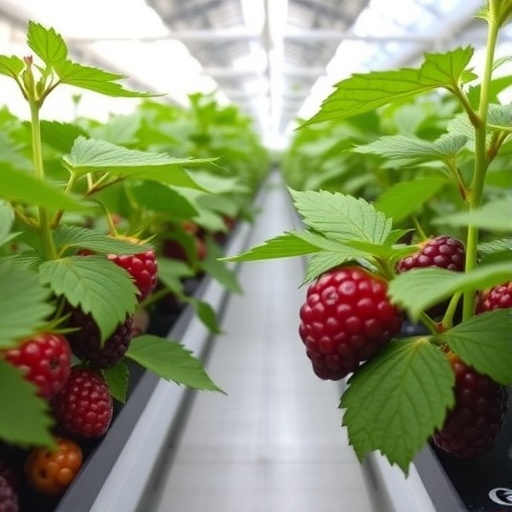
Research into greenhouse berry production is taking a significant step forward, fueled by a generous $5 million investment over three years from the Weston Family Foundation through their Homegrown Innovation Challenge. Simon Fraser University (SFU) is at the forefront of this innovative project, which seeks to revolutionize how berries are produced indoors. Collaborating with industry partner BeriTech, SFU aims to contribute to the sustainable development and scalability of indoor agricultural practices that can bolster Canadian farmers’ capabilities throughout the year.
The initiative is one of four Canadian projects that have benefited from the Scaling Phase of the Homegrown Innovation Challenge. The funding will help researchers continue their groundbreaking trials on indoor blueberry cultivation while expanding their research to include raspberries and blackberries. The central objective is to establish sustainable and economically viable indoor agriculture systems that can consistently support Canadian farmers regardless of the external climate. This is increasingly crucial as climate change continues to disrupt traditional farming practices.
At the helm of this ambitious project is Jim Mattsson, a biological sciences professor at SFU. His research team is dedicated to tackling the myriad challenges associated with indoor berry production, including optimizing plant genetics and creating ideal growing conditions. A key focus of their investigation is the cultivation of berry varieties that can thrive indoors, addressing the smaller yield typically associated with existing genetically-modified options that produce shorter-stature plants. Eric Gerbrandt, the Chief Science Officer at BeriTech, emphasizes the goal of striking a balance between inputs and outputs to make berries available to consumers at a reasonable price.
.adsslot_JVNlREc5ML{width:728px !important;height:90px !important;}
@media(max-width:1199px){ .adsslot_JVNlREc5ML{width:468px !important;height:60px !important;}
}
@media(max-width:767px){ .adsslot_JVNlREc5ML{width:320px !important;height:50px !important;}
}
ADVERTISEMENT
One of the poignant aspects of this research involves working closely with raspberry farmers who are eager to extend their growing seasons. These farmers are interested in adopting greenhouse technology but often lack the necessary expertise to implement such systems effectively. The SFU-BeriTech collaboration aims to fill this knowledge gap and equip farmers with the sustainable solutions they need to thrive in an evolving agricultural landscape.
A significant component of this research involves developing high-yield, compact berry varieties that will flourish in indoor settings. This initiative adopts a dual-focused approach: enhancing the genetics of berry plants while also creating affordable technology and growing systems that make indoor farming feasible. Mattsson provides insight into this process, discussing how various genetic modifications can yield plants that maintain health while adopting a smaller stature, thereby allowing them to thrive in space-constrained environments.
The challenge of lowering production costs is coupled with the necessity of maintaining high-quality produce. With the rising consumer demand for flavorful and nutritious fruits, improving the sensory qualities of the berries is non-negotiable. Mattsson explains that flavor hinges on two primary factors: sugar content and specific flavoring compounds. To that end, the research team aims to enhance the production of raspberry ketone, a compound responsible for the distinct flavor that resonates with many people. The objective is to reach the taste profiles that evoke fond childhood memories of berry consumption.
While the focus is predominantly on berries, the implications of this research extend to a broader context in agriculture. By developing systems capable of producing a variety of crops year-round, this research lays the groundwork for creating more resilient food systems capable of withstanding external pressures, such as climate change and upheaval in global supply chains. This resilience is increasingly critical as countries aim to reduce dependency on imported foods, ensuring a stable and sustainable domestic food supply.
Not only is enhancing yield and sustainability important, but also the culture of local food. This research holds the potential to foster a deeper connection between community members and the food they consume. By promoting locally grown produce, farmers can cultivate a deeper rapport with consumers, leading to a culture that values freshness and quality over mass-produced alternatives that often can’t match the flavor of locally sourced fruits.
The Homegrown Innovation Challenge, supported by the Weston Family Foundation, is a broad initiative designed to fund innovative developments that would enable Canadian producers to grow fruits out of season sustainably. Over a span of six years and with a total funding of $33 million, the challenge aims to unlock pathways for future agricultural technologies and practices. By successfully implementing out-of-season berry production techniques, the research could unlock solutions for a variety of other fruits and vegetables, broadening the scope of sustainable agriculture.
As the challenge unfolds, its repercussions on Canadian agriculture and local economies will be monitored closely. The endeavor not only aims to improve seasonality but also taps into the essence of agricultural sustainability. In a world where the effects of climate change intensify and communities seek more reliable food sources, the implications of successfully implementing indoor berry production are immense.
In conclusion, this innovative research emerging from Simon Fraser University signifies an important stride towards redefining the agricultural landscape in Canada. The collaboration between academic experts and industry professionals exemplifies the changing paradigm in farming practices where technological advancements can lead to sustainable growth. With the groundwork being laid for a future where farmers can cultivate berries year-round, consumers can expect tasty and nutritious options that reflect both quality and sustainability.
Subject of Research: Indoor Berry Production
Article Title: Transforming Canada’s Berry Production: Indoor Innovations and Sustainable Practices
News Publication Date: October 2023
Web References: Homegrown Innovation Challenge
References: N/A
Image Credits: N/A
Keywords
Tags: agricultural technology advancementsBeriTech collaborationblueberry cultivation trialsCanadian agricultural sustainabilityclimate change impact on farmingHomegrown Innovation Challengeindoor berry productionindoor farming practicesoptimizing plant genetics for indoor cropsraspberry and blackberry researchSFU greenhouse innovationsustainable agriculture research





